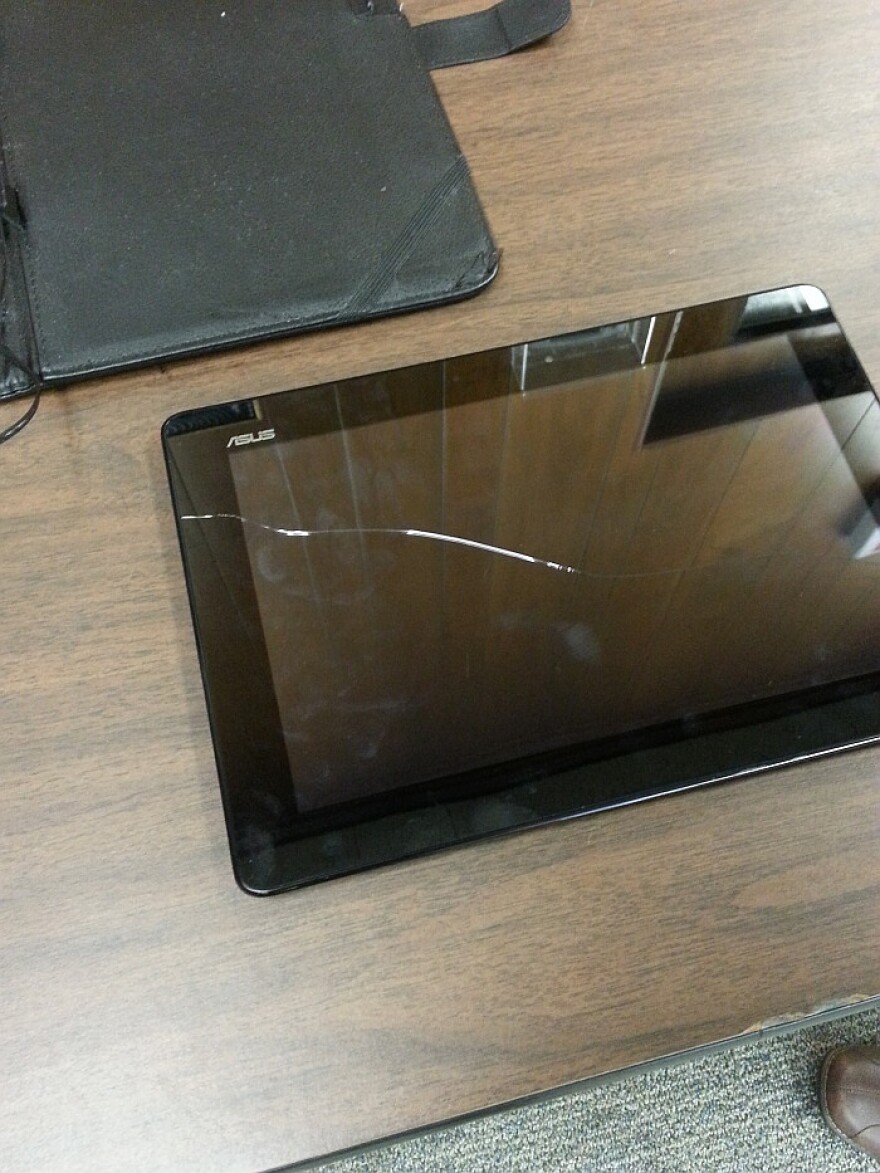Students in Guilford County have tablet computers...again. The federally funded initiative first began in August of 2013, but school officials suspended the program weeks later after more than 10-percent of the devices broke. Now, middle school students have tablets from a different manufacturer.
At Jamestown Middle School several students surround a table in the media center. Their necks careen downward and their fingers move comfortably across glass screens. These tablets have games in math, social studies and science.
"Basically you’re just trying to become the biggest microorganism of them all and then there’s like anti-matter," says Shey, an eighth grader with long hair, who enjoys the science game osmosis. "You get absorbed or you absorb them. It’s like the life of a microorganism."
'People were dropping them on the floor, throwing them across the hallways. People were like animals. But now they have Gorilla Glass for those animals.' - student
Tablets are back in Guilford County a year after being removed. District officials halted the program indefinitely when some tablets overheated, a few chargers melted and nearly 2,000 devices had to be replaced.
Sierra is a 13-year-old eighth grader. She remembers last year’s roll-out didn’t go quite like this.
"It was a success in some ways, but people did not like the tablets so they broke them on purpose. It was a mess. People were dropping them on the floor, throwing them across the hallways... yeah pretty much. People were like animals. But now they have Gorilla Glass for those animals."
Those initial tablets were supposed to have specialized Gorilla Glass. They didn’t. And many of the issues last fall had to do with cracked screens.

Students and educators say these new devices are more durable.
"It’s much better, it’s heavier, [the] case is much better. I’ve dropped mine a couple of times and it hasn’t broken. It’s like the difference between a cheap phone and a more expensive phone – you can just tell the difference," said Susan Bradner as social studies and language arts teacher.
Change in manufacturer
These new tablets are made by Intel. The first batch came from a different company, Azus. The district still contracts with Amplify, a for-profit education company that provides content.
Sierra, the eighth grader says these devices have much better Wi-Fi and a larger Amplify store for apps, games and support
"Now, these new features they have make the tablets a little better [so] people will actually like the tablets," Sierra said. "Some people still don’t and are trying to break them, but they can’t. But it’s working a lot better than before and it’s going smoother."
Damage decrease
Compared to last year - lost, stolen, damaged and defective tablets are down about 60-percent.
Robin Britt oversees this program. It was funded by a $30 million federal Race to the Top grant. He says fewer issues allow teachers to spend more time on the educational components of this initiative. Britt adds one primary goal is for teachers to become more facilitator than instructor, giving students greater autonomy.
"So the student has a better idea of 'What do I need to learn; what do I already know and what do I not know need to work on.' And to use all the knowledge about themselves to make choices about what they learn and when they learn," said Britt.
Britt knows that goal is something that will take time. For now, teachers are learning to utilize a device that has built-in visual, auditory and hands-on learning.
Kathleen Stevens teaches 7th grade math and says it all recently clicked during a group activity.
"They were engaged, they were taking notes, they were pausing and asking questions. It was the coolest thing I’d ever seen because they were all in it – there weren’t behavior issues going on," said Stevens.
With the technical issues under control, Stevens and her colleagues hope tablets will now lead to greater learning and better test scores for the students.








